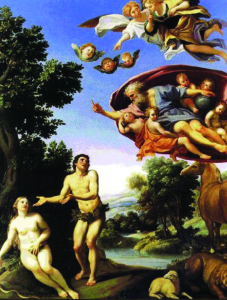One of the most tiring gags of the secular world is the use of the term ‘Immaculate Conception’ to explain an unexpected pregnancy. Even within the Catholic laity there is a general misconception about this term and what it means.
Those who do not understand its meaning attribute the term to the conception of Our Lord, but that is not the case. In fact, the Immaculate Conception had occurred before the Annunciation had even taken place.
Original Sin
We are all familiar with the account of the fall, contained in the Book of Genesis. Adam and Eve disobeyed God and he banished them from the Garden of Eden. As a consequence of this, all humans are born with what is known as Original Sin. At our Baptism we are cleansed of this Original Sin, yet by our very human nature we still retain the attraction to sin: concupiscence. This is illustrated simply in the life of Cain, son of Adam and Eve: ‘The LORD said to Cain, “Why are you angry, and why has your countenance fallen? If you do well, will you not be accepted? And if you do not do well, sin is lurking at the door; its desire is for you, but you must master it.” (Genesis 4:6-7)
While we are cleansed of our sins through the Sacrament of Baptism we are still drawn to sin, it’s allure is far too strong for us to resist it altogether, try as we might, and as such we alternate between periods of sin and grace (after we have been absolved of our sins through the Sacrament of Confession).
We are required to be in a state of grace in order to receive Holy Communion and should also be so disposed when receiving other Sacraments such as Confirmation or Marriage. This state of grace means that we have no unconfessed mortal sins on our conscience. A mortal sin is a sin: ‘whose object is grave matter and which is also committed with full knowledge and deliberate consent.’ (Catechism of the Catholic Church 1857)
Grave matter is outlined in the Ten Commandments, like murder or theft for instance. So, if I stole a bike and knew that it was wrong and still did it, then I have committed a mortal sin.
Original Grace
Each day, through the Rosary alone, we recite the prayer of the ‘Hail Mary’ over fifty times and yet often we fail to realise what gems of faith this short prayer contains. ‘Hail Mary, full of grace,’ within these five words is contained the essence of the Immaculate Conception. Mary was conceived and born without the stain of Original Sin on her soul.
That’s right, Mary is the only human person (Jesus is not included here as he is a divine person) born without sin. Free from sin, Mary is in a state of grace and is then, ‘full of grace’. In addition to being free from the stain of Original Sin, Mary is also free of concupiscence – the attraction to sin. She is pure of body, mind and soul. Pope Pius IX wrote: ‘The Church has made it clear that the conception of Mary is to be venerated as something extraordinary, wonderful, eminently holy, and different from the conception of all other human beings.’
‘…The Blessed Virgin was through grace, entirely free from every stain of sin, and from corruption of body, soul and mind: she was always united with God and joined by him to an eternal covenant; she was never in darkness but always in light; and therefore she was entirely a fit habitation for Christ, not because of the state of her body, but because of her original grace.’ (Ineffable Deus 1858)
God chose Mary to be the mother of his Son, and as such he bestowed her with the tremendous gift of ‘original grace’ and set her apart as a holy woman.
The late John Paul II wrote that God chose Mary before he had even created the world and entrusted her with holiness for all eternity. (cf. Redemptoris Mater)
‘Hail Mary, full of grace’ – next time we recite these words, we should all reflect on the tremendous gift that God gave Mary, original grace, and pray that our lives might come ever closer to her amazing example.
Originally posted 2014-12-30 23:48:45.


